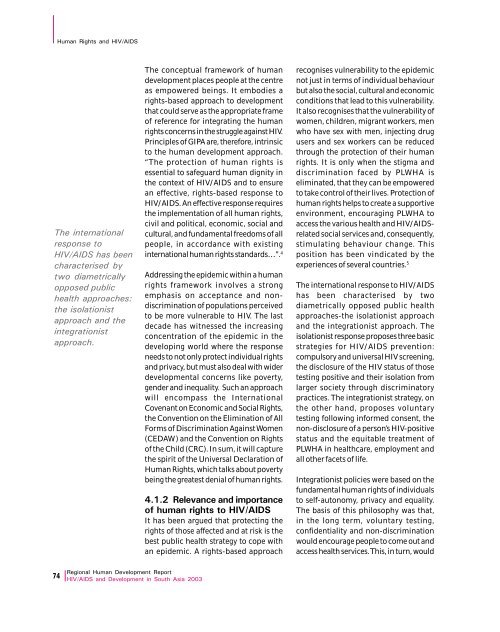Download Report - UNDP Asia-Pacific Regional Centre - United ...
Download Report - UNDP Asia-Pacific Regional Centre - United ...
Download Report - UNDP Asia-Pacific Regional Centre - United ...
Create successful ePaper yourself
Turn your PDF publications into a flip-book with our unique Google optimized e-Paper software.
Human Rights and HIV/AIDSThe internationalresponse toHIV/AIDS has beencharacterised bytwo diametricallyopposed publichealth approaches:the isolationistapproach and theintegrationistapproach.The conceptual framework of humandevelopment places people at the centreas empowered beings. It embodies arights-based approach to developmentthat could serve as the appropriate frameof reference for integrating the humanrights concerns in the struggle against HIV.Principles of GIPA are, therefore, intrinsicto the human development approach.“The protection of human rights isessential to safeguard human dignity inthe context of HIV/AIDS and to ensurean effective, rights-based response toHIV/AIDS. An effective response requiresthe implementation of all human rights,civil and political, economic, social andcultural, and fundamental freedoms of allpeople, in accordance with existinginternational human rights standards…”. 4Addressing the epidemic within a humanrights framework involves a strongemphasis on acceptance and nondiscriminationof populations perceivedto be more vulnerable to HIV. The lastdecade has witnessed the increasingconcentration of the epidemic in thedeveloping world where the responseneeds to not only protect individual rightsand privacy, but must also deal with widerdevelopmental concerns like poverty,gender and inequality. Such an approachwill encompass the InternationalCovenant on Economic and Social Rights,the Convention on the Elimination of AllForms of Discrimination Against Women(CEDAW) and the Convention on Rightsof the Child (CRC). In sum, it will capturethe spirit of the Universal Declaration ofHuman Rights, which talks about povertybeing the greatest denial of human rights.4.1.2 Relevance and importanceof human rights to HIV/AIDSIt has been argued that protecting therights of those affected and at risk is thebest public health strategy to cope withan epidemic. A rights-based approachrecognises vulnerability to the epidemicnot just in terms of individual behaviourbut also the social, cultural and economicconditions that lead to this vulnerability.It also recognises that the vulnerability ofwomen, children, migrant workers, menwho have sex with men, injecting drugusers and sex workers can be reducedthrough the protection of their humanrights. It is only when the stigma anddiscrimination faced by PLWHA iseliminated, that they can be empoweredto take control of their lives. Protection ofhuman rights helps to create a supportiveenvironment, encouraging PLWHA toaccess the various health and HIV/AIDSrelatedsocial services and, consequently,stimulating behaviour change. Thisposition has been vindicated by theexperiences of several countries. 5The international response to HIV/AIDShas been characterised by twodiametrically opposed public healthapproaches-the isolationist approachand the integrationist approach. Theisolationist response proposes three basicstrategies for HIV/AIDS prevention:compulsory and universal HIV screening,the disclosure of the HIV status of thosetesting positive and their isolation fromlarger society through discriminatorypractices. The integrationist strategy, onthe other hand, proposes voluntarytesting following informed consent, thenon-disclosure of a person’s HIV-positivestatus and the equitable treatment ofPLWHA in healthcare, employment andall other facets of life.Integrationist policies were based on thefundamental human rights of individualsto self-autonomy, privacy and equality.The basis of this philosophy was that,in the long term, voluntary testing,confidentiality and non-discriminationwould encourage people to come out andaccess health services. This, in turn, would74<strong>Regional</strong> Human Development <strong>Report</strong>HIV/AIDS and Development in South <strong>Asia</strong> 2003
















